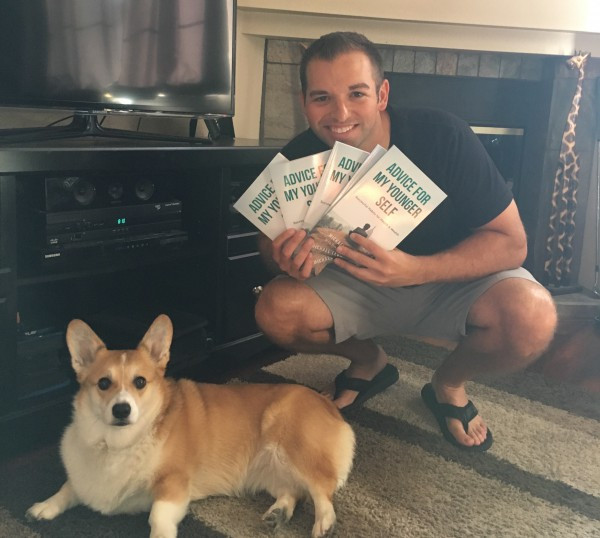
Interview with Michael about being an entrepreneur and freelancer
How did you get started with remote work?
I got started with remote work because I was tired of the 9-5 grind. I had a high paying job, but I was miserable. I hated having a boss, working on stuff that didn't interest me and having a schedule.
I wanted to create an online brand, but knew it took time to grow/monetize a website so freelance writing helped in the interim. Last week was my one year anniversary.
I quit my six-figure job with absolutely ZERO money coming in, I made $60 from my blog when I left corporate America. I saved over 12 months of living expenses in a separate account and forced myself to figure it out.
Freelancing was much harder than I anticipated in the beginning.
At the time I left I also just published my first book, Advice for My Younger Self. This added a new income stream along with my blog and random side hustles. It took some time guest posting, learning new skills, and building a portfolio to get recurring clients on projects that I enjoyed working on.
If I'm not building my blog and freelancing business I'm working on my golf game as I'm turning professional in the next six months.
Read 114 answers from other remote workers
What are you working on?
I am currently freelance writing for individual blogs, large websites, and producing content for my blog, Inspire Your Success.
Some clients I'm given the outline while others I have free reign on creating articles around topics they want.
I write anywhere from 8-15+ articles per week. Some are short 500 word posts while others are more comprehensive, research based posts up to 4,000 words.
Read 107 answers from other remote workers
What's your typical work routine?
Here is an overview of my work routine:
- Personal, 1 hour morning routine (journal, meditation, etc)
- Exercise (run or resistance training) (30-60 mins)
- Write / Create content — can start anywhere from 7-9am. I prioritize my projects the night before always doing the hardest, most time consuming or least "fun" piece of work first. This builds momentum and makes sure I accomplish the biggest task first.
- I've found I write best fasted, only drinking coffee and water until noon. I break around 12 for a light lunch, walk the dog, get outside, and back to writing. Usually done by 2-3pm depending on deadlines.
- My writing usually takes place Mon, Tue, & Thur. I edit content, promote my blog, and do other projects on Wed/Fri (never write and edit on the same day).
- Rarely, if ever, write on weekends instead focusing on off time and creating urgency during my week to get everything completed. I try to set specific time blocks to complete my writing or other projects. Without a set time it's easy to procrastinate and make a small task seem huge.
My routine is constantly changing over time. I think it's important to have it adapt to create maximum efficiency and still mix it up. I write primarily in my office but do go to coffee shops and hotels to get out and mix up the environment.
Read 92 answers from other remote workers
How has your routine changed over time?
My routine has changed a ton in the one year of entrepreneurship and working remotely. At the beginning I had too much freedom.
I felt like I was jumping around on tasks without getting much done. This led to some burnout and low productivity.
Over time I've learned how important it is to schedule the month, week, and even day in advance. It's also super helpful to do a end of week and month recap. This way I can identify what's working, what's not and figure out how to pivot moving forward.
Read 22 answers from other remote workers
Do you have a dedicated space to work?
For physical space I primarily work in my office as it's easier with both monitors and my desk.
When I'm writing I play specific music that helps me concentrate, have my phone silenced, and try to not get up until the work is complete. I'll drink plenty of water and 2 cups of coffee each morning. The music tends to be super loud and enjoy getting in my own space with no interruptions.
I try to break at the top of each hour, stand up, take some deep breaths, and do a few stretches.
Once my work is complete I leave the office and don't work in the living room anymore. I like to have separate spaces in my house associated with separate tasks. Otherwise I had no clear break of work and life.
Read 93 answers from other remote workers
How do you manage having too much or not enough work?
After attending a Mastermind and working with a business coach I realized I was always placing my clients work first (as it was instant money) and sacrificing my long-term goals.
Now I spend 3 days on my stuff (Tuesday/Thursday/Saturday) and 3 days on clients (Monday/Wednesday/Friday).
At the beginning of my entrepreneurial journey, all I had was my site and spent 100% effort on it. I learned monetizing a blog can take time so I started freelancing. Soon I was spending 80-90% on clients and barely any on my own. Now my themed days make it much more equal.
Read 18 answers from other remote workers
How do you stay on task?
I used to struggle with productivity a lot but now I have so many projects with my business and clients that I have to be efficient.
The biggest productivity hack for me is planning the next day the night before, in order of what I will complete.
Each morning starts with a digital detox — 1 hour with my morning routine. This includes journaling, meditating, and reading. This helps start my day fresh and creative.
From there I workout and then I start my work. I always do the hardest tasks first thing when I am most creative and efficient.
If I'm really feeling lazy, usually toward the end of the week, I'll do tasks that don't require much energy — tax stuff, social media posting, etc. For the most part, I try to do the most important work from 7am-1pm.
I set a monthly income goal and work backward by thinking of how much I have guaranteed and what I can do to earn more. I try to maximize efficiency by planning out the month, week, and day in detail. Without specific goals, it's easy to slack off and not be as motivated. As I work at home I also have a no TV rule. I never watch TV before 7 pm to make sure I don't try to sit in front of the TV with my laptop multi-tasking (which rarely works).
Read 100 answers from other remote workers
What do you like about remote work?
The thing I like the most is that I control my destiny.
I hated in salaried positions how someone could do the bare minimum and get paid the same as someone who is an achiever.
I love working remotely as you don't have to worry about the commute, co-workers, or a set schedule.
Read 106 answers from other remote workers
What do you not like about remote work?
There isn't much I don't like about remote work.
Sometimes I have to force myself to stop working because I can get very involved and feel like there is always something to be done. Occasionally it would be nice to work with like-minded people and have been making a much better effort to network with others.
I would say is that not everyone is cut out for a remote working job. It takes a lot of discipline and drive to make it happen. It could be easy to get lonely as you are largely isolated and might not fit everyone's lifestyle.
Read 103 answers from other remote workers
What tools do you use to stay productive?
As far as tools for remote work nothing crazy; laptop, desktop, video conference Zoom or Skype.
I use Asana and Trello with clients but I track everything on my end with Google Docs and Google Calendar.
Read 108 answers from other remote workers
What did we forget to ask Michael Leonard?
At RemoteHabits we're always trying to improve our interviews, what question should we have asked Michael Leonard?
Biography
Michael Leonard
Michael is an online entrepreneur, author, and freelance writer who specializes in self-improvement and personal finance. His blog, Inspire Your Success, teaches others success habits, tips, and routines to create the life they deserve. He is a contributor to Goalcast, Fearless Motivation, and other top personal development sites.
To get in touch email Michael or follow him on Twitter at @supamillennial for more inspirational content.
Work remotely? Share your story on RemoteHabits!
Want to be interviewed? If you have a remote position, head over to the interview me page!
Looking for a remote job?
RemoteHabits Jobs has everything you need to find your next great remote work position!
Related Interviews
Interview with Nelvina, a fashion designer who designs bags and clothing
Nelvina is a freelance fashion and graphic designer that works remotely while working with clients all around the world
Interview with Andrew, co-founder and CEO of Insured Nomads
Andrew, co-founder, and CEO of Insured Nomads talks traveling while working, productivity tools, and the best advice he has received.
Interview with Scott about working remotely for 20 years
Scott is a designer and developer that's been working remotely since 1998, read his interview to learn how he's been successful


